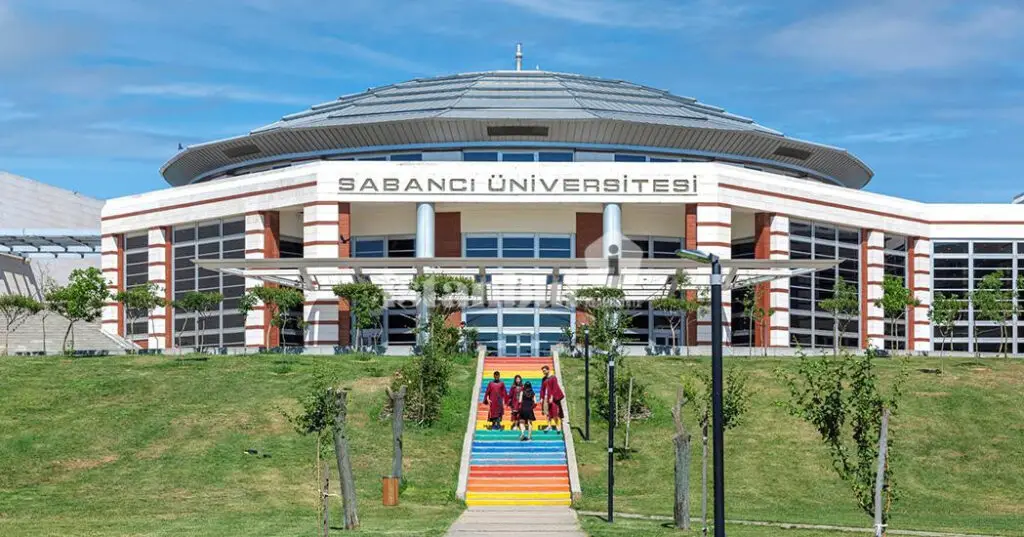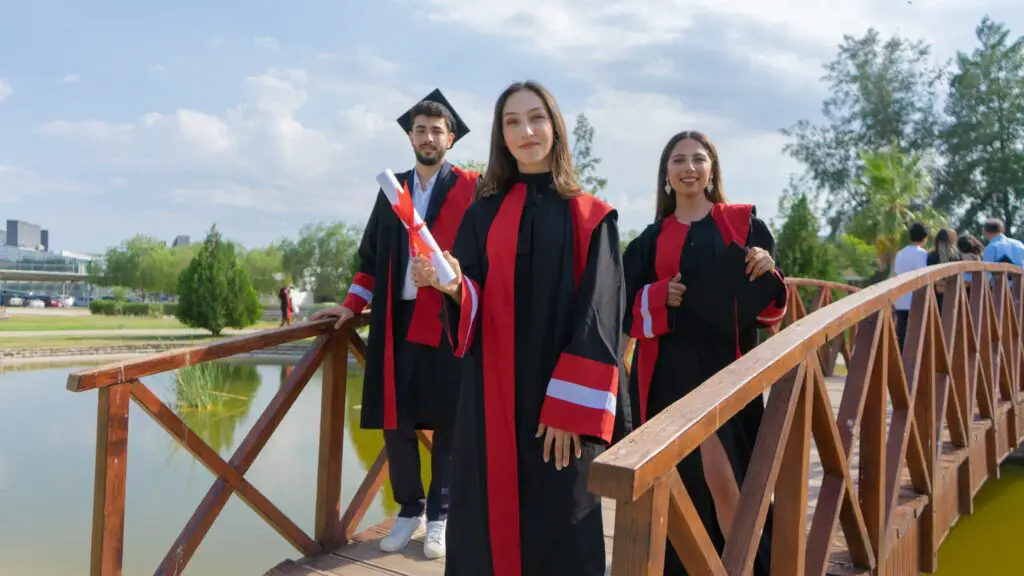If you’re considering studying abroad, Turkey has become one of the most attractive destinations for international students in recent years. With its rich cultural heritage, affordable tuition fees, and internationally recognized universities, more than 250,000 students from around the world now choose to study in Turkey every year.
Located at the crossroads of Europe and Asia, Turkey offers a unique experience that combines modern academic standards with centuries of history and culture. Whether your goal is to study in Istanbul, explore research opportunities in Ankara, or join vibrant student communities in Izmir, Turkey provides a wide range of choices across public and private universities.
In this guide, we’ll walk you through everything you need to know: why Turkey is a great study destination, the best universities, degree levels, most popular majors, requirements for admission, scholarships, cost of living, and what student life really looks like. By the end, you’ll have a clear picture of what it takes to start your educational journey in Turkey and how to make the most of it.
About Turkey
Turkey is a country that bridges two continents — Europe and Asia — and this unique position makes it an exciting destination for international students. Beyond its famous history, breathtaking landscapes, and rich culture, Turkey is home to more than 200 universities, many of which rank among the top institutions worldwide.
As a member of the Bologna Process, Turkey’s higher education system is aligned with European standards, ensuring that degrees are widely recognized and transferable. The country has invested heavily in education over the past two decades, creating opportunities for both local and international students to pursue studies in diverse fields.
From the bustling streets of Istanbul, a global hub of trade and culture, to the academic heart of Ankara, Turkey offers not only quality education but also an enriching lifestyle. Students find themselves surrounded by history, innovation, and an environment that encourages both academic and personal growth.
For anyone planning to study in Turkey, understanding the cultural and educational backdrop is the first step to appreciating why this country has become one of the fastest-growing study destinations in the world.
Why Study in Turkey?

Choosing where to pursue higher education is one of the most important decisions in a student’s life. Turkey has become a rising destination for international students, and here’s why:
- Affordable Tuition Fees – Compared to the U.S., U.K., and many European countries, tuition fees in Turkey are much lower while still maintaining high academic standards. Public universities, in particular, offer some of the most cost-effective education options in the region.
- Globally Recognized Degrees – Thanks to Turkey’s participation in the Bologna Process and the adoption of the ECTS (European Credit Transfer System), degrees earned in Turkey are widely recognized across Europe, Asia, and the Middle East.
- Wide Range of Programs – Many universities offer courses taught in English, alongside Turkish. This makes it easier for international students to pursue majors in fields like medicine, engineering, business, and computer science.
- Cultural Diversity & Location – Positioned between Europe and Asia, Turkey offers students a unique chance to experience both Western and Eastern cultures. Cities like Istanbul, Ankara, and Izmir are vibrant hubs of history, culture, and modern living.
- Student-Friendly Environment – With more than 250,000 international students, Turkey has built strong support systems including scholarships, dormitories, student clubs, and international offices that help newcomers adapt quickly.
In short, students who study in Turkey gain not only a degree but also valuable cultural experiences, new perspectives, and a lifestyle that combines affordability with quality.
Top Universities in Turkey for International Students

Turkey is home to more than 200 universities, offering a mix of public and private institutions that attract students from across the world. Many of these universities rank highly in QS World University Rankings and have strong partnerships with international institutions, making Turkey an excellent choice for higher education.
Public Universities in Turkey for International Students
Public universities in Turkey are known for their affordable tuition fees and strong academic reputations. Most are research-driven and offer a wide variety of programs in both Turkish and English.
- Istanbul University – One of the oldest universities in Turkey (established in 1453), located in the heart of Istanbul. Known for medicine, law, and social sciences.
- Middle East Technical University (METU) – Based in Ankara, famous for engineering, architecture, and science programs. Classes are often taught in English.
- Ankara University – A leading public institution with a wide range of faculties, from political sciences to health sciences.
- Ege University (Izmir) – Recognized for medicine, engineering, and agricultural sciences.
Private Universities in Turkey for International Students
Private universities, also known as foundation universities, tend to offer more modern campuses, smaller class sizes, and extensive support for international students. While tuition fees are higher than public universities, they often provide scholarships that reduce costs significantly.
- Koç University (Istanbul) – Highly ranked in QS, known for research excellence, especially in medicine, engineering, and social sciences.
- Sabancı University (Istanbul) – Offers flexible programs with an interdisciplinary approach; very popular among international students.
- Bilkent University (Ankara) – One of Turkey’s first private universities, ranked among the top globally for engineering and technology.
- Bahçeşehir University (Istanbul) – Famous for its slogan “University of the World,” offering English-taught programs and global exchange opportunities.
Whether you choose a public or private university in Turkey, you’ll find options that match a wide range of academic interests and career goals.
Are Turkish Universities Internationally Recognized?

One of the first questions international students ask is: “Will my degree from Turkey be valid in my country?”
The answer is yes — in most cases. Turkish universities are regulated by the Council of Higher Education (YÖK), which ensures quality and academic standards across the country. Additionally, Turkey is part of the Bologna Process, which aligns its higher education system with European standards. This means that degrees from Turkey follow the ECTS (European Credit Transfer System) and are generally recognized across Europe and beyond.
Key Points on Recognition
- European Union & EHEA Countries – Thanks to the Bologna Process, degrees from Turkey are accepted in most EU countries.
- Gulf & Middle Eastern Countries – Many Turkish universities are recognized by Ministries of Education in Qatar, UAE, Saudi Arabia, and other Arab countries.
- Asia & Africa – Recognition varies, but Turkey has bilateral agreements with several countries for mutual recognition of degrees.
- Accreditation Checks – Before applying, students should confirm with their own country’s Ministry of Education or professional boards (especially in fields like medicine, law, and engineering).
Bottom line: If you plan to study in Turkey, your degree will usually be recognized internationally — but always double-check with your home country’s official authorities for specific requirements.
Stages of Higher Education in Turkey
Turkey’s higher education system follows the Bologna Process, meaning its degrees are structured in a way that’s familiar to European standards. Students can choose from different levels of study, depending on their goals and academic background.
1. Associate Degree (Ön Lisans)
- Duration: 2 years
- Offered mainly by vocational schools and some universities.
- Focus: Practical and career-oriented programs (e.g., tourism, health technician, IT).
2. Bachelor’s Degree (Lisans)
- Duration: 4 years (except Medicine, Dentistry, Veterinary which are 5–6 years).
- The most common path for international students.
- Wide choice of programs in engineering, medicine, business, social sciences, and arts.
3. Master’s Degree (Yüksek Lisans)
- Duration: 2 years
- Two types: With Thesis (research-focused) and Without Thesis (professional track).
- Many programs available in English, especially in private universities.
4. Doctorate Degree (Doktora)
- Duration: 3–5 years
- Advanced research programs requiring a thesis.
- Popular in fields like engineering, medicine, social sciences, and natural sciences.
5. Medical Specialization (Tıpta Uzmanlık)
- Equivalent to residency training.
- Competitive entry, requires exams (TUS for medicine, DUS for dentistry).
- Highly valued internationally, especially in Middle Eastern and Asian countries.
Difference Between Public and Private Universities in Turkey
| Feature | Public Universities | Private (Foundation) Universities |
|---|---|---|
| Tuition Fees | Lower (approx. $500–$2,000 per year) | Higher ($3,000–$15,000 per year) |
| Language of Instruction | Mostly Turkish, some English programs | Many English-taught programs |
| Admissions | Competitive (YÖS exam, GPA, SAT) | Easier, often based on high school GPA + language proficiency |
| Campus Facilities | Large, traditional campuses | Modern, technology-driven campuses |
| International Student Support | Limited compared to private | Strong international offices, scholarships, support services |
Top Majors to Study in Turkey for International Students

When choosing where to study, many international students not only look at the quality of education but also at the career opportunities that follow. Turkey has become a strong destination for several in-demand majors that combine global recognition with affordable tuition.
Medicine & Health Sciences
Turkey is one of the most popular destinations for medical studies. Public universities like Istanbul University and private ones like Acıbadem University offer world-class programs.
- Why Turkey? Affordable tuition compared to Europe/USA, access to modern hospitals for training, and recognition in many Gulf and Asian countries.
- Career Path: Doctors, surgeons, pharmacists, nurses with options to work in Turkey or abroad after equivalency exams.
Engineering
Engineering is a top choice for students in civil, mechanical, electrical, and computer engineering. Universities like METU, ITU, and Koç University are highly respected.
- Why Turkey? Strong academic foundations, English-taught programs, and Turkey’s booming infrastructure and tech industries.
- Career Path: Engineering jobs across Europe, Gulf, and Turkey’s growing tech and construction sectors.
Business & Administration
With Istanbul being a hub of global trade, business programs are highly attractive. Universities like Bilkent, Sabancı, and Bahçeşehir provide international-standard business schools.
- Why Turkey? Strategic location for global commerce + English MBA programs.
- Career Path: Finance, management, entrepreneurship, consulting in Turkey and internationally.
Architecture & Interior Design
Turkey’s rich cultural heritage makes it a natural hub for architecture and design studies.
- Why Turkey? Blend of traditional Ottoman and modern architecture; Istanbul is a living lab for design.
- Career Path: Architects, interior designers, urban planners.
Computer Science & Artificial Intelligence
With the digital economy growing fast, Turkish universities are expanding in software engineering, AI, and data science.
- Why Turkey? Affordable programs with modern labs, growing startup ecosystem.
- Career Path: Software developers, AI engineers, data scientists in Turkey and abroad.
Aviation & Aeronautical Engineering
Turkey is home to Turkish Aerospace Industries and major airlines, fueling demand for aviation studies.
- Why Turkey? State investment in aviation, specialized universities like Anadolu University.
- Career Path: Pilots, aerospace engineers, airline management.
Arts & Humanities
From Turkish literature to international relations, humanities remain strong fields of study.
- Why Turkey? Unique cultural blend, growing demand for international studies and cultural diplomacy.
- Career Path: Diplomacy, academia, NGOs, media.
Students who study in Turkey in these majors not only gain academic knowledge but also benefit from strong career opportunities both locally and internationally.
Requirements to Study in Turkey

Applying to universities in Turkey is a structured process, but the requirements may vary depending on whether you choose a public university or a private (foundation) university. Understanding the documents, exams, and admission criteria is essential for a smooth application.
General Requirements for International Students
- A valid high school diploma (for undergraduate programs) or bachelor’s/master’s diploma (for postgraduate programs).
- Transcripts showing grades and GPA.
- Passport copy and photographs.
- Proof of language proficiency: TOEFL/IELTS for English programs, or TOMER certificate for Turkish programs.
- Entrance exams:
- YÖS Exam (used by many public universities for international applicants).
- SAT / ACT (some public universities accept these).
- Letter of motivation & recommendation (for some programs).
- Application fee (varies by university).
Requirements for Public Universities
- Competitive admission process.
- Applicants often need to take the YÖS Exam or submit international exam scores (SAT, ACT, IB).
- Higher GPA requirements compared to private universities.
- Limited number of seats for international students.
Requirements for Private Universities
- More flexible admission process.
- Admission usually based on high school diploma + English/Turkish language certificate.
- No YÖS exam required in most cases.
- Many offer programs fully in English, especially in majors like medicine, engineering, and business.
🤝 How We Can Help You – Goalantis.com Collaboration
We understand that choosing the right major and university is a crucial and life-changing decision for your academic and professional future. That’s why, in collaboration with Goalantis Study Abroad, we provide comprehensive and personalized support from the moment you start thinking about studying until you are fully enrolled in your chosen university.
Our services include:
- Specialized Academic Consultation – Helping you identify the most suitable major based on your interests and skills, with accurate information about internationally recognized universities (especially in medical majors).
- University & Program Recommendations – Tailored to your budget, academic background, and preferred language of study (Turkish or English), with detailed insights into admission chances.
- Application Submission – Preparing all required documents, ensuring professional translations, submitting applications on your behalf, and following up with universities step by step.
- Scholarships & Discounts – Assisting you in applying for scholarships, with access to exclusive discounts from Study Sehir partners.
- Logistical & Administrative Support – From student residence permits to accommodation arrangements and university registration, we ensure a hassle-free process.
- Ongoing Support During Studies – Our dedicated team remains available to assist you with any academic or administrative issues throughout your time in Turkey.
Turkish Scholarships for International Students

One of the main reasons students choose to study in Turkey is the availability of scholarships and financial aid. These opportunities make higher education in Turkey accessible to students from diverse backgrounds.
Türkiye Bursları (Turkey Government Scholarship)
The Türkiye Scholarships Program is the most well-known scholarship offered by the Turkish government.
- Covers full tuition fees.
- Provides monthly stipends (around $100–$300 depending on the degree).
- Includes accommodation support, health insurance, and one-year Turkish language preparation.
- Open to undergraduate, master’s, PhD, and research students.
- Highly competitive, with thousands of applicants each year.
University-Specific Scholarships
Many private universities in Istanbul, Ankara, and Izmir offer generous scholarships for international students. These can be:
- Merit-based (based on academic performance).
- Need-based (for students with financial challenges).
- Special discounts for early applicants or those from partner institutions.
NGO & Foundation Scholarships
Some organizations and foundations in Turkey also provide partial scholarships or financial aid, especially for students from developing countries.
How We Support Students in Scholarship Applications
Applying for scholarships in Turkey can be competitive and sometimes overwhelming. That’s why our collaboration with Goalantis.com helps students maximize their chances:
- We guide you through eligibility requirements and identify the most suitable scholarship opportunities.
- We assist in preparing strong motivation letters, recommendation letters, and CVs.
- We submit your applications on time and follow up with the scholarship committees.
- We provide access to exclusive university discounts through our partner network.
Cost of Living in Turkey for Students

One of the biggest advantages of choosing to study in Turkey is the relatively affordable cost of living compared to Europe or North America. Still, expenses vary depending on the city, lifestyle, and whether you study in a public or private university.
Average Monthly Expenses
| Expense Category | Istanbul (USD) | Other Cities (Ankara, Izmir, Bursa) (USD) |
|---|---|---|
| Accommodation (dorms, shared flats) | $150 – $400 | $100 – $250 |
| Food & Groceries | $150 – $250 | $120 – $200 |
| Transportation (student card, metro, bus) | $30 – $50 | $20 – $40 |
| Utilities & Internet | $50 – $70 | $40 – $60 |
| Health Insurance | $30 – $50 | $30 – $50 |
| Personal Expenses (leisure, shopping, etc.) | $70 – $150 | $50 – $120 |
| Total Monthly Estimate | $480 – $970 | $360 – $720 |
💡 Note: Costs vary depending on lifestyle choices. Dormitories and student discounts can lower expenses significantly.
Tuition Fees in Turkey
- Public Universities: $500 – $2,000 per year (depending on the program & language of study).
- Private Universities: $2,500 – $30,000 per year based on university ranking, Major and other factors (scholarships may reduce this).
Why Turkey is Affordable for Students
- Discounted student transportation cards.
- Wide availability of student dormitories (public KYK dorms are the cheapest).
- Meals at university cafeterias can cost as little as $1–$2 per meal.
- Many student-friendly discounts on cultural events, museums, and public services.
Overall, Turkey offers high-quality education at a fraction of the cost compared to countries with similar academic standards.
Student Life in Turkey
Studying in Turkey is not just about academics — it’s also about experiencing a country that blends history, culture, and modern living. With more than 250,000 international students, Turkey has built a dynamic student community where it’s easy to feel at home.
Campus Experience
Most universities in Turkey offer modern campuses with libraries, sports centers, laboratories, and vibrant student clubs. Whether you join a photography club, debate society, or cultural association, you’ll find plenty of opportunities to make friends and engage in activities outside the classroom.
Living in Major Cities
- Istanbul – The cultural capital of Turkey, we are talking about one of the most famous cities in the word for traveling, offering a mix of history and cosmopolitan living. Students enjoy museums, Bosphorus cruises, and a bustling nightlife.
- Ankara – The political and academic hub, home to top universities like METU and Bilkent, with a calmer lifestyle compared to Istanbul.
- Izmir – A coastal city known for its laid-back atmosphere, beaches, and student-friendly environment.
- Bursa & Eskişehir – Smaller cities with strong student populations, lower living costs, and a welcoming local culture.
Cultural Diversity
International students enjoy a multicultural environment where Eastern and Western traditions meet. Turkish hospitality is well-known, and students are often invited to local homes during holidays like Ramadan Bayram (Eid) or Republic Day celebrations.
Erasmus & Exchange Programs
Many Turkish universities are part of the Erasmus+ program, allowing students to spend a semester in Europe while paying Turkish tuition fees — a cost-effective way to gain global exposure.
Daily Student Life
- Affordable meals in university cafeterias ($1–$2 per plate).
- Student discounts for transport, cinema, and cultural events.
- Opportunities to travel within Turkey at low cost (bus, train, or budget airlines).
In short, student life in Turkey combines high-quality education with rich cultural experiences, making it one of the most rewarding destinations for international students.
Challenges of Studying in Turkey

While Turkey offers many advantages for international students, it’s important to be aware of the challenges you might face. The good news is that with the right preparation, most of these obstacles can be managed smoothly.
1. Language Barrier
- Challenge: Although many programs are taught in English, daily life in Turkey often requires some knowledge of Turkish.
- Solution: Taking a short TÖMER Turkish language course can help with communication, making daily life and part-time jobs much easier. Also most the universities offering a year of study Turkish language (prepared Year) before starting your study in Turkey.
2. Bureaucracy & Paperwork
- Challenge: Applying for residence permits, health insurance, and university registrations can feel overwhelming.
- Solution: Universities have international offices to guide you, and educational partners like Goalantis.com provide step-by-step support for students.
3. Cultural Adaptation
- Challenge: Adjusting to new customs, food, and social norms can take time.
- Solution: Joining student clubs, Erasmus networks, and international student communities helps you adapt faster and make friends.
4. Financial Planning
- Challenge: While Turkey is affordable, unexpected costs (currency fluctuations, accommodation upgrades) may arise.
- Solution: Applying for scholarships and budgeting monthly expenses carefully can ease financial pressure.
5. Academic Adjustment
- Challenge: Teaching styles in Turkey may differ from what you are used to (more theory-heavy in public universities, more practical in private).
- Solution: Seek academic advising, join study groups, and don’t hesitate to use university support centers.
Studying abroad always comes with challenges, but Turkey offers strong support networks, affordable options, and welcoming communities that make the transition much smoother.
Tips for International Students in Turkey
Moving to a new country can feel overwhelming, but the right preparation makes the transition much easier. Here are some essential tips for students planning to study in Turkey:
- Learn Basic Turkish Early
Even if your program is in English, knowing everyday Turkish phrases will help you with shopping, transport, and building friendships. - Use Student Discounts
Always carry your student ID — it gives you access to reduced fares on buses, metro, ferries, and discounts at museums, theaters, and cultural events. - Choose Accommodation Wisely
University dormitories are the cheapest option, but private dorms and shared flats may offer more comfort. Decide based on your budget and lifestyle. - Stay Organized with Documents
Keep copies of your passport, residence permit, health insurance, and university letters. Bureaucracy in Turkey can be strict, and having everything ready saves time. - Explore Beyond the Classroom
Don’t just focus on academics — travel across Turkey, from Cappadocia’s caves to Antalya’s beaches, and experience the cultural richness firsthand. - Build a Support Network
Join international student associations, Erasmus clubs, or cultural communities to make friends and ease cultural adaptation. - Apply Early for Scholarships
Deadlines come quickly, and early applications have a higher chance of success. - Embrace Turkish Hospitality
Turks are known for their warm welcome — be open to new friendships, invitations, and cultural exchanges.
Conclusion
Turkey has rapidly become one of the most attractive destinations for international students, offering high-quality education, affordable tuition, diverse programs, and a vibrant cultural experience. From world-class universities in Istanbul and Ankara to the welcoming communities in smaller cities, Turkey gives students the chance to grow academically, professionally, and personally.
Choosing to study in Turkey is more than just earning a degree — it’s an opportunity to experience a unique culture, build global connections, and prepare for a successful career in today’s competitive world.
If you’re ready to take the next step, remember that you don’t have to do it alone. Through our collaboration with Goalantis.com, we provide full support — from choosing the right major and applying to universities, to securing scholarships and settling into student life in Turkey. Our mission is to make your educational journey smooth, affordable, and rewarding.
Need more information? you can contact us now.
Your future starts here — and Turkey might just be the perfect place to begin it.
Frequently Asked Questions (FAQ)
What are the requirements to study in Turkey?
To apply to universities in Turkey, international students generally need a high school diploma (or bachelor’s degree for postgraduate programs), transcripts, a valid passport, proof of language proficiency (TOEFL/IELTS for English programs or TOMER for Turkish), and application forms. Public universities often require the YÖS exam, SAT, or ACT, while private universities usually admit students based on GPA and language certificates. Additional requirements may include a motivation letter, recommendation letters, and application fees.
Is studying in Turkey free?
Studying in Turkey is not completely free, but there are many scholarship opportunities. The most famous is Türkiye Bursları (Turkey Government Scholarship), which covers tuition fees, accommodation, stipends, health insurance, and even Turkish language courses. Some universities also offer partial scholarships or discounts for international students. If you are not on a scholarship, public universities remain very affordable compared to Europe or the U.S., with annual tuition starting from as low as $500.
Is it expensive to study in Istanbul compared to other cities?
Yes, Istanbul is generally more expensive than other Turkish cities due to its size and popularity. Monthly living costs for students in Istanbul range between $500–$900, while in cities like Ankara, Izmir, or Bursa, costs can be as low as $350–$700. Tuition fees are similar nationwide, but housing and food are costlier in Istanbul. Students can still save money by using dormitories, student discounts, and public transport cards.
Can international students work in Turkey while studying?
Yes, international students in Turkey can work part-time, but only after obtaining a work permit. Undergraduate students may find it more challenging, while postgraduate and PhD students often have easier access to research assistantships or part-time jobs at universities. Many students also work in language tutoring, hospitality, or IT sectors. However, working hours are limited, so most students rely primarily on scholarships, family support, or savings for their living expenses.
Are Turkish degrees recognized internationally?
Yes. Turkey is part of the Bologna Process, which means its higher education system is aligned with European standards. Degrees follow the ECTS credit system, making them widely recognized across Europe. Many programs are also accepted in Gulf, Middle Eastern, and Asian countries. However, recognition may depend on your field (e.g., medicine, law, engineering) and your country’s regulations, so it’s always best to confirm with your home Ministry of Education or professional boards.
Which is better: public or private universities in Turkey?
It depends on your goals. Public universities are more affordable and highly respected, especially for medicine, engineering, and law. They often require entrance exams like YÖS or SAT. Private universities (foundation universities) offer modern campuses, English-taught programs, and stronger international student support, but tuition fees are higher. Many private universities provide scholarships that make them competitive with public universities. For international students, private universities can offer a smoother admission process and better support services.
